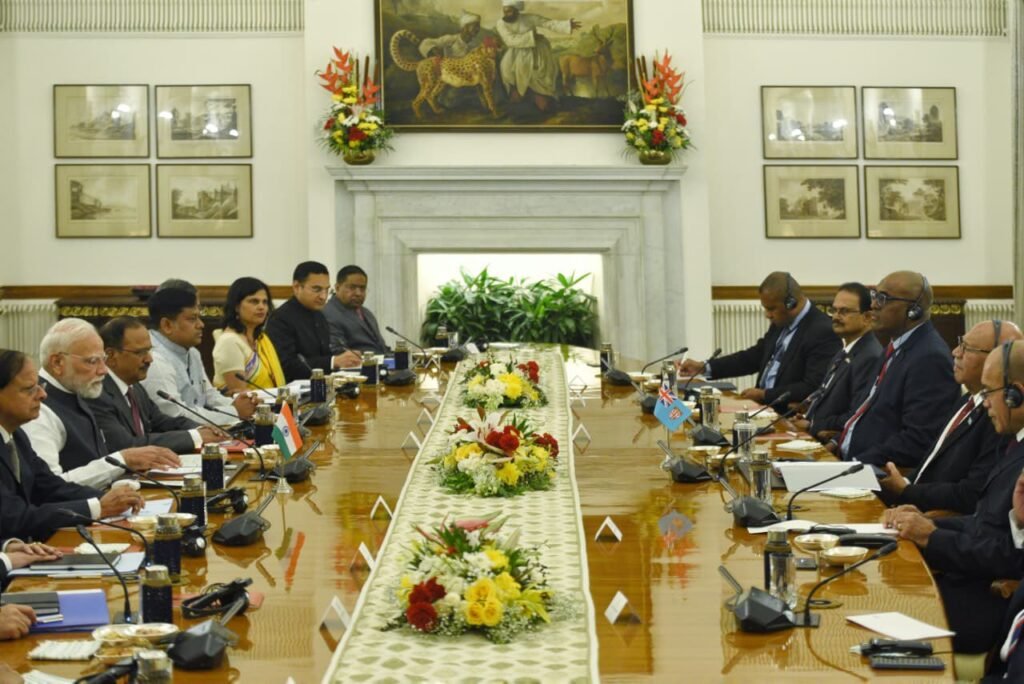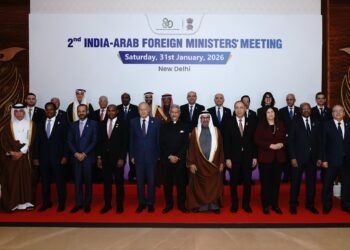NEW DELHI: When Fiji’s Prime Minister Sitiveni Rabuka landed in India on August 24 for a three-day visit, few expected the depth of outcomes that would follow. Yet by August 25, India and Fiji had unveiled a sweeping partnership covering health, defense, trade, culture, education, agriculture, mobility, and digital security branding it a relationship in the spirit of Veilomani Dosti.
The agreements were wide-ranging: a Super-Specialty Hospital in Fiji, Janaushadhi medicine supplies, a BIS – DNTMS pact on standardization, NIELIT – Pacific Polytech skilling programs, Quick Impact Projects, migration and mobility frameworks, the handing over of India’s Chancery Building lease in Suva, and a joint statement sealing the “Veilomani Dosti” partnership.
The announcements were equally ambitious. Fiji’s Parliament and Great Council of Chiefs will visit India in 2026. An Indian naval ship will dock in Fiji in 2025. India will post a Defense Attaché in Suva, gift ambulances to the Royal Fiji Military Forces, and help establish a Cyber Security Training Cell. Fiji will join the Indo-Pacific Oceans Initiative (IPOI). New MoUs will link the Confederation of Indian Industry (CII) with Fiji Commerce & Employers Federation, and NABARD with the Fiji Development Bank. A Hindi-Sanskrit teacher will join the University of Fiji. Mobile soil labs, agricultural drones, and training for Fijian sugar experts have already been dispatched. Jaipur Foot camps, specialized treatments through Heal in India, and even a cricket coach from India round off the people-to-people touch—topped by Fiji allowing Indian ghee on its shelves.
At first glance, this agenda may look technocratic labs, drones, ambulances, teacher deputations. But its strategic depth is unmistakable. India is not just sending aid; it is embedding systemic change. The health pillar- hospital, medicines, Jaipur Foot, ambulances resonates across the Pacific, where climate shocks often turn into public health crises. Unlike short-term relief, India is offering resilience.

The standardization and skills accords go to the nuts and bolts of cooperation. Harmonized regulations (BIS–DNTMS) and digital skills training (NIELIT–Pacific Polytech) ensure sustainable capacity. A cyber training center strengthens Fiji’s digital sovereignty, while mobility agreements, cultural exchanges, and teacher deputations weave long-term human links. Even cricket coaching shows cultural empathy: sports remain Fiji’s strong social glue.
The defense and maritime track is equally telling. A Defense Attaché, naval visit, and Fiji’s entry into IPOI don’t signal bloc politics. They highlight India’s role in humanitarian assistance, ocean stewardship, and disaster relief positioning New Delhi’s Indo-Pacific vision as inclusive and developmental. As Prime Minister Modi heads to Tianjin for the SCO summit, Fiji becomes a timely showcase of India’s “capabilities, not camps” model.
This isn’t lost on Beijing. While China may read India’s maritime moves as domain awareness in the South Pacific, the optics remain centered on development. That is the quiet genius of the partnership: harder to dismiss hospitals, cyber training, and soil labs as “containment” than an aircraft carrier.
Beyond Fiji, the model fits into India’s Pacific outreach via FIPIC and dovetails with Japan’s initiatives. For other small states, it offers a replicable path: partnership without coercive finance, capacity without dependency. In Tianjin, Modi is likely to frame four core points: human security (health, disaster resilience, affordable medicines), maritime public goods (HADR, ocean sustainability), cyber capacity (cooperative safeguards), and interoperable standards (supply chain trust).
Perhaps the most powerful element is perception. Modi’s remark, “India and Fiji may be oceans apart, but our aspirations sail in the same boat,” underlined dignity alongside delivery. By embracing the local idea of Veilomani Dosti—friendship rooted in empathy both sides fused cultural closeness with strategic pragmatism.
The test, however, lies in implementation: making the hospital functional, ensuring drones reach farmers, embedding the Defense Attaché as a real coordinator. If done well, this partnership could redefine diplomacy in the Pacific not through force, but through statecraft built on resilience and respect.
Ultimately, Veilomani Dosti is more than symbolism. It is a blueprint for a new diplomacy where oceans divide geographies but not hopes. India and Fiji have shown how middle powers and small states can co-create influence through shared capacity rather than zero-sum competition.
— Dr. Shahid Siddiqui | Follow on X: @shahidsiddiqui
WATCH, LIKE & SUBSCRIBE FOR GLOBAL NEWS UPDATES

















